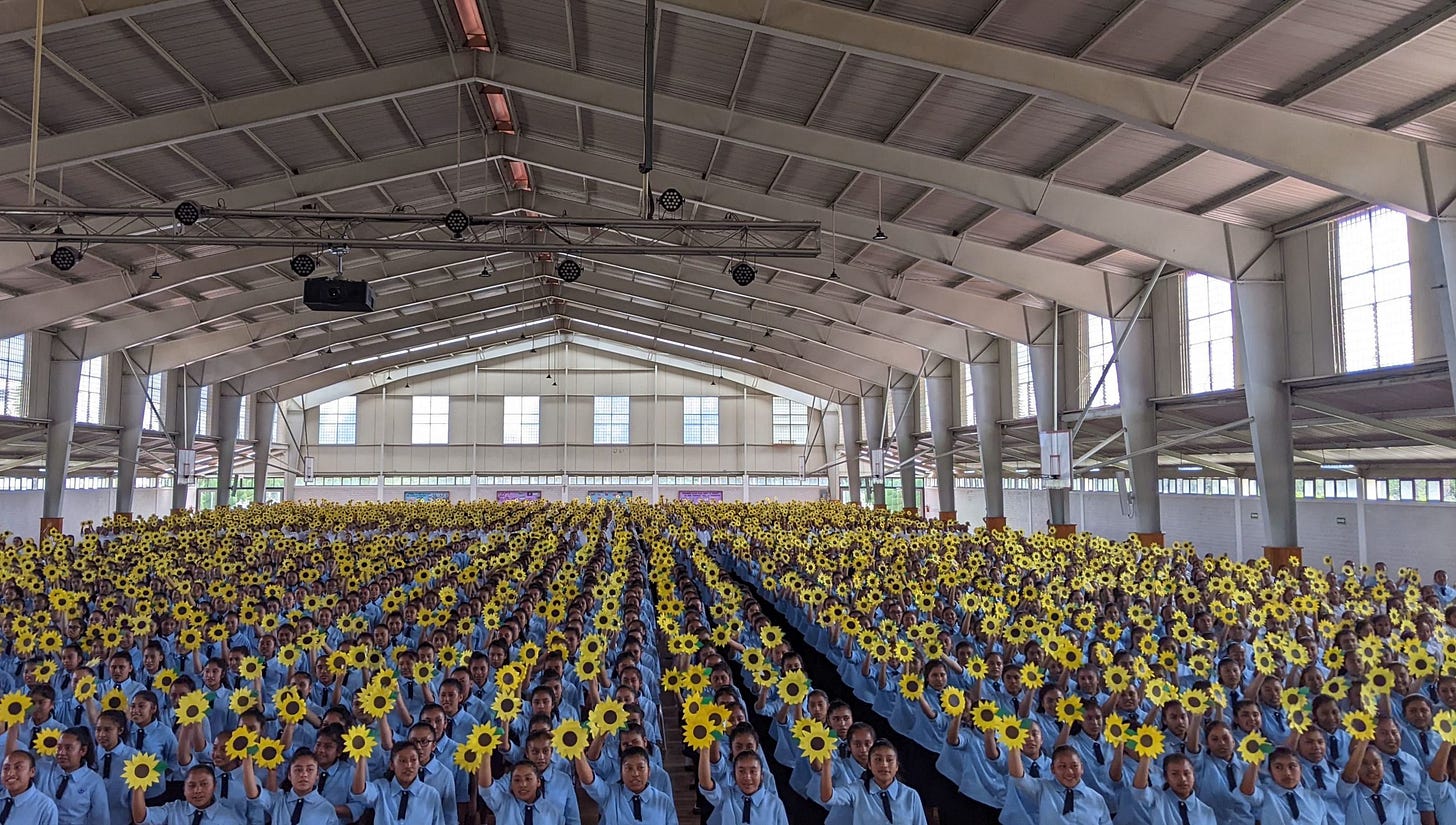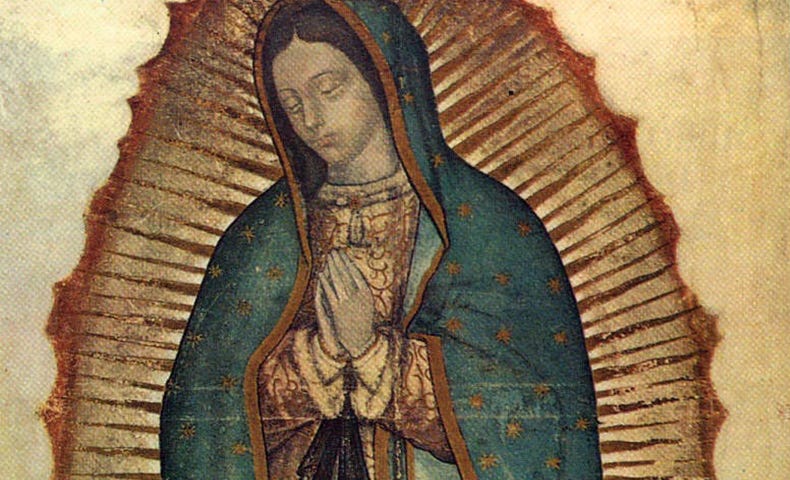I remember casually asking my parents one day if they ever felt that they were ready to retire at my age. At 30 years old, and less than 4 years into my career as a veterinarian, I was experiencing a deep restlessness. The seeming monotony of life and the demands of work made me feel that life was happening to me rather than something I was truly living. And while I thought I longed for the greener pastures of the retirement home, I knew that I was seeking something deeper. To find that I needed to go out of my comfort zone, far enough out that I would be open to anything, even hearing the Lord’s voice.
Together with a dear friend who was experiencing a similar sense of restlessness, we signed up for an alumni mission trip to Mexico City with the University of Maryland Catholic Terps. As someone who had never been on a mission trip and speaks very poor Spanish (despite years of education and living with a roommate who spoke Spanish fluently), this was a step into the unknown. Each day we had time for Mass and, usually, a holy hour. And as I entered into the mission, the first prayer I made was to offer any fears that might hold me back from giving or receiving the love that God desired to give to me on this mission. My biggest fear was the inability to connect with others on a meaningful level due to barriers in language. I already wondered what I could possibly offer to those that I would be serving on this trip, and to not even speak the language made me feel that I had even less to offer. I brought this to God and resolved to trust that He had led me here and all He asked was for me to be faithful. And so the journey began.
Our first stop was to the convent where we would stay. The cloistered sisters had prepared rooms for each of us and made sandwiches. It was obvious that these acts were done with great love and care. We were told that these sisters had been praying for us, for our mission, and for our conversion. I would barely see them during our stay but I would wake up to their beautiful singing at Mass. Their lack of physical presence on our trip, despite their obvious tender care, began to convince me that love transcends physical presence and that love does not require words.
On the next day, we went to an orphanage where physically or mentally disabled children were left by their parents in the care of a 95 year old nun. Many of these “children” were now in their forties or fifties but had no place to go. Many were non-verbal and could only communicate through the most basic of sounds. And in that moment, God showed me that no words were needed for this experience. A hand on the back, eye contact, interacting with a simple joy, these were treasures for people that the world had forgotten and cast away. They didn’t ask for money, toys, or even words. They asked for just my presence, a gift that I had forgotten that I had to offer. And as if these treasures were not enough, we were led to a back room where a glass container held gloves that Padre Pio had worn. Still pondering these things in my heart, I boarded the bus.
Our next stop was meeting with former prostitutes, women trying to better their lives, and their children. Many of these women were forced to make very difficult decisions and experienced betrayal and great pain. Unable to relate to this experience, I wondered what I could offer to these women. But in only looking at their pain, I forgot who, in essence, they were: children of God. And just like many other women who have known less pain and who have experienced less betrayal in life, these women still loved to dance. We danced the macarena with them. We taught them the Cotton Eye Joe. And just like any parent, they loved to see us interact with their children. We would play sports or duck, duck, goose (also known as bato, bato, ganzo). We were assigned children as our “godchildren” and bought gifts for them for el Dia de los Reyes (or Three Kings Day), which is more popularly celebrated in Hispanic countries. I remember my one child Jonathan. The language barrier made it difficult to communicate and he was a young boy, so we had very little in common. But I clearly remember choosing to go play soccer, basketball (for which I have no talent), and letting him show me his toys, rather than forcing him to stay with the women—and thereby forcing him to stay within my comfort zone. This was the best way that I could show him love, and he sensed my desire to show it. After another day of deep connection, I continued to hold these things in my heart.
Our last stop was to Girlstown, a boarding school in Chalco, Mexico founded by Venerable Aloysius Schwartz, a priest from the Archdiocese of Washington, D.C., who founded a religious order and many charities. This school was gorgeous and the girls were unafraid to dream big. I even met a girl who wanted to be a veterinarian. In an auditorium with 3,500 middle and high school girls and religious sisters, we attended Mass. Afterwards, we were asked to come on stage. The girls, the sisters, they wanted to sing to us “You Are My Sunshine,” a song with deep meaning for me since my grandmother would frequently sing it. These girls not only sang the song to us: they also sang it in English. It was as if the Lord, in that moment, invited me to just accept my poverty, in this case a lack of language, and accept the gift of these girls who lovingly were singing to me in my own language, these girls who met me where I was. These girls would light up when you just smiled and waved or said a simple word to them. It was the closest I have felt and probably will ever feel to being a celebrity. The experience felt unearned, and unwarranted, and it was. But the experience was a gift—the same gift of unearned and unwarranted and overwhelming affection that God desires to pour out on us.

Reflecting on these experiences, I realized how much love transcends our capacity for language. After all, Jesus spoke very few words on his way to the Cross. But does the Cross not convey the depth of his love, a love willing to pour itself out totally, completely, and freely when a drop of blood would suffice? And does the gift of the Eucharist, His very body, not convey the duration of His love, that remains with us forever? Even the Virgin Mother, while speaking tenderly to Juan Diego and affirming her motherhood of all, leaves us her image in the tilma. The image possesses a deep symbolism that the Aztec people understood, and image that converted the hearts and minds of millions: no further sacrifice of human life is necessary for Christ, her Son, has made the ultimate sacrifice. The saints, too, show their love, not with words but through their fidelity to the call which God gave them. Saints such as Saint Jose Sanchez del Rio, a simple boy living in Mexico in the 1920s. Jose joined the Cristero movement when the Mexican government targeted the Catholic population by seizing property, closing churches, and murdering priests. When captured, he refused to deny Christ and was subsequently tortured: the bottoms of his feet removed, and he was forced to walk to the grave where he would then be shot. For Jose, it was his lack of words, the words that would deny the very truth he was called to witness, that revealed his love.
We may not be called to that kind of martyrdom, but we can all become more fluent in the language of love.
Needless to say, I didn’t miraculously become a Spanish speaker on a week long mission trip to Mexico. But I did deepen my understanding of the language of love. Ultimately, love transcends all that we know and experience. After all, God is love, St. John tells us. To attempt to limit love to a language that is spoken misses the bigger picture: love is a choice and the choice is what gives love its meaning. When I choose to love, it means that I could have chosen another path, one perhaps that is more convenient or beneficial for me, but I chose a path that leads to the good of another. Sometimes our love is recognized, accepted, and reciprocated. And sometimes, as Christ experienced in His passion, our love is rejected, spurned, and mocked. Yet we cannot become discouraged from doing the work of love. Just as Christ set his face on Jerusalem, we are called to live unafraid of speaking the language of love, knowing that we have the best teacher from whom to learn.
And, as if I haven’t said enough about love already, let me conclude with one of my favorite quotes from C.S. Lewis:
To love at all is to be vulnerable. Love anything and your heart will be wrung and possibly broken. If you want to make sure of keeping it intact you must give it to no one, not even an animal. Wrap it carefully round with hobbies and little luxuries; avoid all entanglements. Lock it up safe in the casket or coffin of your selfishness. But in that casket, safe, dark, motionless, airless, it will change. It will not be broken; it will become unbreakable, impenetrable, irredeemable. To love is to be vulnerable.
— C.S. Lewis, The Four Loves
Christina Betta is a Baltimore local who, when she isn’t treating a sick cat or amputating a dog’s leg, might just be working on her needlepoint during a football game.

